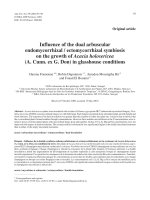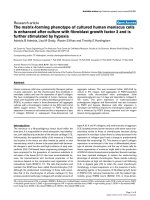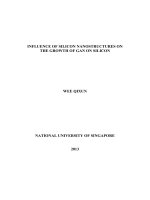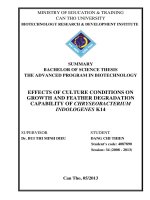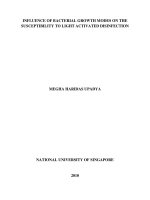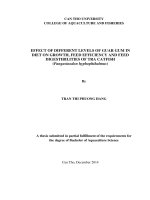Influence of culture media on growth, colony character and sporulation of Chaetomium globosum fungus
Bạn đang xem bản rút gọn của tài liệu. Xem và tải ngay bản đầy đủ của tài liệu tại đây (289.05 KB, 6 trang )
Int.J.Curr.Microbiol.App.Sci (2020) 9(5): 2567-2572
International Journal of Current Microbiology and Applied Sciences
ISSN: 2319-7706 Volume 9 Number 5 (2020)
Journal homepage:
Original Research Article
/>
Influence of Culture Media on Growth, Colony Character and Sporulation
of Chaetomium globosum Fungus
K. W. Uikey*, K. S. Raghuwanshi and D. W. Uikey
Department of Plant Pathology and Agricultural Microbiology, PGI, M.P.K.V.,
Rahuri, Maharashtra, India
*Corresponding author
ABSTRACT
Keywords
Mycelial growth,
Colony character,
Sporulation, Culture
media
Article Info
Accepted:
18 April 2020
Available Online:
10 May 2020
The mycelial growth rate, colony character and sporulation pattern of
Chaetomium globosum, grown on seven different culture media viz., Potato
Dextrose Agar (PDA), Czapek’s Dox media, Yeast Extract Agar,
Sabouraud media, Oatmeal Agar, Malt Extract Agar and Lignocellulose
Agar (LCA) were observed after seven days of incubation at 25±1°C. The
colony diameter, culture characteristics and sporulation of Chaetomium
globosum were greatly influenced by the type of growth medium used.
Sabouraud medium exhibited comparatively higher mycelial growth of
Chaetomium globosum, followed by Potato Dextrose and lignocelluloses
agar medium. With regard to sporulation, excellent sporulation was
observed on sabouraud medium. Poor sporulation was observed on malt
extract agar. These results will be useful for fungal taxonomic studies.
Introduction
Fungi grow on diverse habitats in nature and
are cosmopolitan in distribution requiring
several specific elements for growth and
reproduction. In laboratory, these are isolated
on specific culture medium for cultivation,
preservation, microscopical examination and
biochemical
and
physiological
characterization. A wide range of media are
used for isolation of different groups of fungi
that influence the vegetative growth and
colony morphology, pigmentation and
sporulation depending upon the composition
of specific culture medium, pH, temperature,
light, water availability and surrounding
atmospheric gas mixture (Northolt and
Bullerman, 1982).
Different concepts have been used by the
mycologists to characterize the fungal
species, out of which morphological (phenetic
2567
Int.J.Curr.Microbiol.App.Sci (2020) 9(5): 2567-2572
or phenotypic) and reproductive stages are the
classic approaches and baseline of fungal
taxonomy and nomenclature that are still
valid (Davis, 1995; Guarro et al., 1999; Diba
et al., 2007; Zain et al., 2009). Physical and
chemical factors have a pronounced effect on
diagnostic characters of fungi.
Purification and maintenance of pure
culture
Hence, it is often necessary to use several
media while attempting to identify a fungus in
culture since mycelial growth and sporulation
on artificial media are important biological
characteristics (St-Germain and Summerbell,
1996).
Identification
With these perspectives, the present study was
undertaken to observe the influence of seven
different culture media on the mycelial
growth, colony characters and sporulation
patterns of Chaetomium globosum.
Materials and Methods
Collection of rhizosphere soil sample
The fresh rhizosphere soil samples were
obtained from various places from the field of
M.P.K.V. Rahuri.
The fungus growth that is obtained from the
soil were purified by hyphal tip method and
maintained on fresh potato dextrose agar
medium slant under aseptic condition.
The fungus isolated from diseased specimen
and established in pure form was tentatively
identified on the basis of colony and
morphological characters and observations
were recorded with the help of research
microscope.
Preparation of different media for cultural
studies of Chaetomium globosum fungus
The seven cultures viz., 1) Potato dextrose
agar medium 2) Oatmeal agar medium 3)
Lignocellulose agar medium 4) Malt extract
agar medium 5) Yeast extract agar medium 6)
Sabouraud media 7) Czapek’s Dox agar
medium were prepared in conical flasks of
250 ml capacity separately and taken in petri
dish for isolation of Chaetomium by serial
dilution method and pour plate method.
Sterilization of glasswares and media
Cultural characters
The glasswares required for isolation of
biocontrol agents and soil borne pathogens
were sterilized in hot air oven at 1600C for
two hours. The culture media for isolation of
organisms were steam sterilized at 121.60C
(i.e. 15 1bs pressure / inch2) for 15 minutes.
The study of cultural characters of the fungus
was undertaken with the object to see the
growth behaviour and also to note its
sporulating variability on different cultural
media. For this purpose following cultural
media were studied.
Isolation of Chaetomium globosum
Composition of different media
The soil samples were air dried, grinded and
sieved through 0.50 mm sieve so as to obtain
fine sized particles. The 10.0 g of rhizosphere
soil samples were weighed on electronic
balance and used for isolation purpose by
serial dilution method.
Potato dextrose agar (PDA)
2568
Potato (peeled)
Dextrose
Agar
Distilled water
200 g
20 g
20 g
1000 ml
Int.J.Curr.Microbiol.App.Sci (2020) 9(5): 2567-2572
Czapek’s dox agar (CDA)
Sucrose
Sodium nitrate
Dipotassium hydrogen phosphate
Potassium chloride
Magnesium sulphate
Ferrous sulphate
Agar
Distilled water
3) Agar agar
4) Distilled water
30 g
2g
1g
0.5 g
0.5 g
0.01 g
20 g
1000 ml
Malt extract agar
Malt extract
30.0 g
Mycological peptone 5.0 g
Agar
15.0 g
Distilled water
1000 ml
Oat meal agar medium
1) Oatmeal
2) Agar agar
3) Distilled water
15 g
1000 ml
Thereafter, 5 mm discs of Chaetomium
globosum fungus obtained from pure culture
were transferred at the centre of sterile Petri
dishes (in triplicates) containing seven
different growth media viz., 1) Potato
dextrose agar medium 2) Oatmeal agar
medium 3) Lignocellulose agar medium 4)
Malt extract agar medium 5) Yeast extract
agar medium 6) Sabouraud media 7)
Czapek’s Dox agar medium. The Petri dishes
were then incubated for 7 days at 25±1°C in
BOD incubator and colony character of
Chaetomium globosum fungus was recorded.
Sporulation was assessed on haemocytometer
glass slides by mounting a small portion of
mycelia and observed under microscope.
Results and Discussion
30 g
20 g
1000 ml
Cultural characters of Chaetomium
globosum on different medium
Yeast extract
1) Yeast extract
2) Peptone
3) Agar agar
4) Distilled water
The colony diameter, sporulation and growth
characters of Chaetomium globosum on seven
different media were studied and the results
are represented in (Table 1, Fig. 1) which
revealed that the effect of different media on
growth and sporulation of Chaetomium
globosum was significant.
3g
5g
15 g
1000 ml
Lignocellulose media
1) Glucose
2) Monopotassium phosphate
3) Magnesium sulphate
4) Potassium chloride
5) Sodium nitrate
6) Yeast extract
7) Agar agar
8) Distilled water
Sabouraud dextrose agar
1) Dextrose
2) Peptone
40 g
10 g
1g
1g
0.2 g
0.2 g
2g
0.2 g
13 g
1000 ml
Significantly maximum growth was observed
on sabouraud medium (90 mm) because
glucose or maltose and peptone were the most
suitable carbon and nitrogen source for
Chaetomium growth followed by PDA (63
mm), while minimum growth was observed
on Czapek’s dox agar medium. As regards the
sporulation (Table 1, Fig. 1), highly
sporulation was observed on sabouraud
medium (11.60 × 104). Moderate sporulation
was observed on Potato dextrose agar (10.80
× 104) and lignocellulose medium (9 × 104)
and poor sporulation was observed on malt
extract agar (5.00 x 104).
2569
Int.J.Curr.Microbiol.App.Sci (2020) 9(5): 2567-2572
Table.1 Performance of Chaetomium under different culture medium
Sr.
No.
1
Media
Mean Growth
(mm)
90.00
Mean Spore
Count × (104)
11.60
Sabouraud media
2
Oatmeal agar
20.00
6.40
3
Czapek’s dox agar
media
15.00
6.60
4
Yeast extract
agar
35.00
8.60
5
Lignocellulose
media
45.00
9.00
6
Malt extract
22.33
5.00
7
Potato Dextrose
agar
63.00
10.80
8
9
SE (±)
CD @ 5%
1.51
4.67
0.23
0.67
100
80
60
40
20
0
Growth characters
Very restricted, irregular
growth, dark gray to brown in
colour
Restricted, irregular growth,
Golden brown to yellow in
colour
Very restricted, irregular
growth, Golden brown to
yellow in colour
Restricted, circular to
irregular growth, Golden
brown to yellow in colour
Very restricted, irregular
growth, Light greenish
yellow in colour
Very restricted, circular to
irregular growth, orange gray
in colour
Restricted, circular to
irregular growth, Velvety
Light Yellow in colour
_
_
Growth
Spore count
Chaetomium globosum
Fig.1 Performance of Chaetomium globosum under different culture medium
2570
Int.J.Curr.Microbiol.App.Sci (2020) 9(5): 2567-2572
1) Yeast extract agar medium
3) Czapek’ dox media
5) Lignocellulose medium
7) Potato dextrose agar medium
2) Sabouraud medium
4) Malt extract agar medium
6) Oatmeal agar medium
Plate.1 Performance of Chaetomium globosum under different culture medium
While studying the cultural characters, it was
observed that the fungus produced maximum
growth on sabouraud medium followed by
potato dextrose agar and lignocelluloses agar
medium. With regard to sporulation, excellent
sporulation was observed on sabouraud
medium. Poor sporulation was observed on
malt extract agar.
The results obtained in this study is not
confirmed with the results given by Matthew
et al., (2008) and Sharma et al., (2010) who
studied colony diameters of C. globosum over
4 weeks on different agar media viz., potato
dextrose agar (PDA), oatmeal agar (OA),
cornmeal agar (CMA) and malt extract agar
(MEA) and found that oatmeal agar exhibited
comparatively higher myclial growth and
sporulation.
Our findings revealed that culture media
differentially influenced the growth, colony
character and sporulation of Chaetomium
globosum.
Out of seven test media employed in the
present study, Sabouraud media was found to
be most suitable for heavy growth and
sporulation followed by PDA.
References
Bustohn, W. and Rickard. 1956. The Effect of
a physical barrier on sporulation of
Chaetomium
globosum.
J.
gen.
Microbiol. Vol. 15, 194-197.
Chatterji, B.C. 1966. Some observations on
the growth and sporulation of
Chaetomium globosum in media
containing
ammonium
tartrate.
Transactions of the British Mycological
Society. 49 (3) Pages 397–401.
Davis JI (1995). Species concepts and
phylogenetic analysis. Introduction.
Syst. Bot., 20: 555-559.
Diba K, Kordbacheh P, Mirhendi SH, Rezaie
S, Mahmoudi M (2007).Identification of
Aspergillus species using morphological
characteristics. Pak. J. Med. Sci., 23(6):
2571
Int.J.Curr.Microbiol.App.Sci (2020) 9(5): 2567-2572
867-872.
Domsch, K.H., Gams, W. and Anderson, T.H.
2007. Compendium of soil fungi. 2nd
ed. Munchen: IHW Verlag. 672 p.
Guarro J, Josepa G, Stchigel AM (1999).
Developments in Fungal Taxonomy.
Clin. Microbiol. Rev., 12: 454-500.
Matthew, R., Fogle, D.R., and Straus, D.C.
2008.
Growth
and
mycotoxin
production by Chaetomium globosum is
favoured in a neutral pH. Int. J. Mol.
Sci. Vol. 9, 2357-2365.
Northolt MD, Bullerman LB (1982).
Prevention of mold growth and toxin
production
through
control
of
environmental condition. J. Food Prot.,
6: 519-526.
Sharma, G. and Pandey, R.R. 2010. Influence
of culture media on growth, colony
character and sporulation of fungi
isolated from decaying vegetable
wastes. J. Yeast Fungal Res. Vol. 1(8),
pp. 157-164.
St-Germain G, Summerbell R (1996).
Identifying Filamentous Fungi – A
Clinical Laboratory Handbook, 1st Ed.
Star
Publishing
Co.,
Belmont,
California. UKNCC (1998). Growth and
Media Manuals. Strain databases
(www.ukncc.co.uk/)
Zain ME, Razak AA, El-Sheikh HH, Soliman
HG, Khalil AM (2009). Influence of
growth
medium
on
diagnostic
characters
of
Aspergillus
and
Penicillium species. Afr. J. Microbiol.
Res., 3(5): 280-286.
Zayat, S.A. 2008. Preliminary studies on
laccase production by Chaetomium
globosum an endophytic fungus in
Glinus lotoide, American-Eurasian I.
Agric. & Environ Sci. 3 (1): ISSN 18:
18-6769, 86-90.
How to cite this article:
Uikey, K. W., K. S. Raghuwanshi and Uikey, D. W. 2020. Influence of Culture Media on
Growth, Colony Character and Sporulation of Chaetomium globosum Fungus.
Int.J.Curr.Microbiol.App.Sci. 9(05): 2567-2572. doi: />
2572

